James Gunn Interview: How Making Guardians Of The Galaxy Is Like A Nirvana Song
In September 2013, I visited the London-based set of Marvel Studios' Guardians of the Galaxy (you can find out more about what we learned and watch a video blog reaction here). While on set, we are able to talk with many of the key cast and crew and will be posting transcripts from those roundtable interviews all this week. First up is director James Gunn, who found a few moments in between filming to talk with us about how he became involved in the movie, his philosophies behind the choices in this film, casting choice, the pressure of filming a big budget tentpole superhero movie, and much much more. Read the full James Gunn interview after the jump.
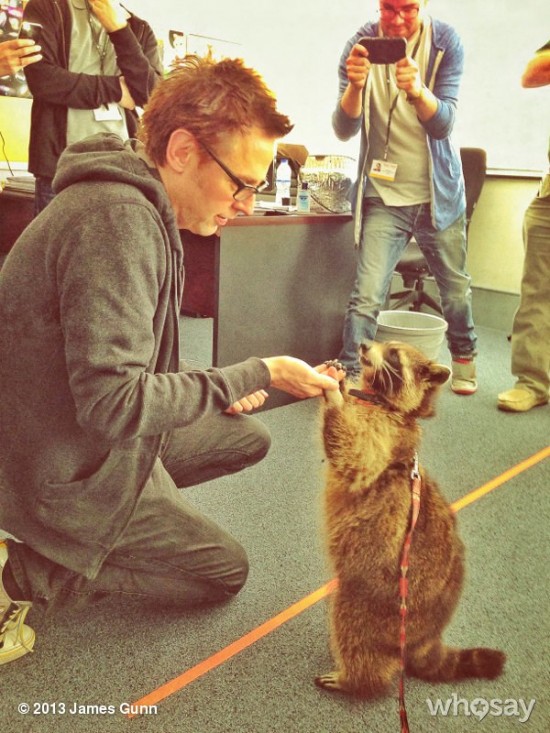 Question: How did you manage to convince Marvel to do an expensive PG porn?JAMES GUNN: They're fucking crazy. It's true, it's true. It's not PG porn.Starting with the sizzle that we saw this morning–GUNN: Where did you see the sizzle, from Comic-Con?
Question: How did you manage to convince Marvel to do an expensive PG porn?JAMES GUNN: They're fucking crazy. It's true, it's true. It's not PG porn.Starting with the sizzle that we saw this morning–GUNN: Where did you see the sizzle, from Comic-Con?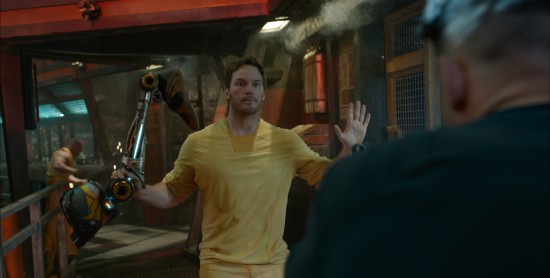 We saw that and the behind the scenes. The scale of this is so different than anything else you've ever done. Has it been a radically different experience for you as a filmmaker or is it still about voice and about character and defining a world?GUNN: Yeah. I mean, I'd say radically different yes and no. For me it all comes back to just my own experience, so in some ways I think it's probably a little boring. For me, just because of the length of it, it makes it a much different experience from doing something like Super which we shot in 24 days for 3 million dollars. We had to do like 50 set-ups a day. So it was just a harrowing, tough experience. And this is difficult but because it's over such a long period of time. On a day-to-day basis it's actually a lot more—using the word "easy" is not the greatest thing but yeah, it's easier. Because you do have more time for the set up, you have more time for planning. We had more time for planning, period.
We saw that and the behind the scenes. The scale of this is so different than anything else you've ever done. Has it been a radically different experience for you as a filmmaker or is it still about voice and about character and defining a world?GUNN: Yeah. I mean, I'd say radically different yes and no. For me it all comes back to just my own experience, so in some ways I think it's probably a little boring. For me, just because of the length of it, it makes it a much different experience from doing something like Super which we shot in 24 days for 3 million dollars. We had to do like 50 set-ups a day. So it was just a harrowing, tough experience. And this is difficult but because it's over such a long period of time. On a day-to-day basis it's actually a lot more—using the word "easy" is not the greatest thing but yeah, it's easier. Because you do have more time for the set up, you have more time for planning. We had more time for planning, period.
We have more time between sets and I think the biggest difference is having a lot of people around me I can trust. I mean, on most every movie I have maybe one or two people who I really trust. Like on Super, I trusted the DP, Steve Gaynor, an awful lot. I trusted Rainn Wilson an awful lot but there's a lot of people who are in independent films and who you're getting — who you can get. And on this movie it's like I'm just surrounded by a lot of people who really make me breathe easier, which is everyone from Charlie Wood, who did the production design—he and I have been in a 100% full sync from the beginning—to you know, my assistant, Simon. I mean, just everybody's just really good at their job so that's been a huge relief.
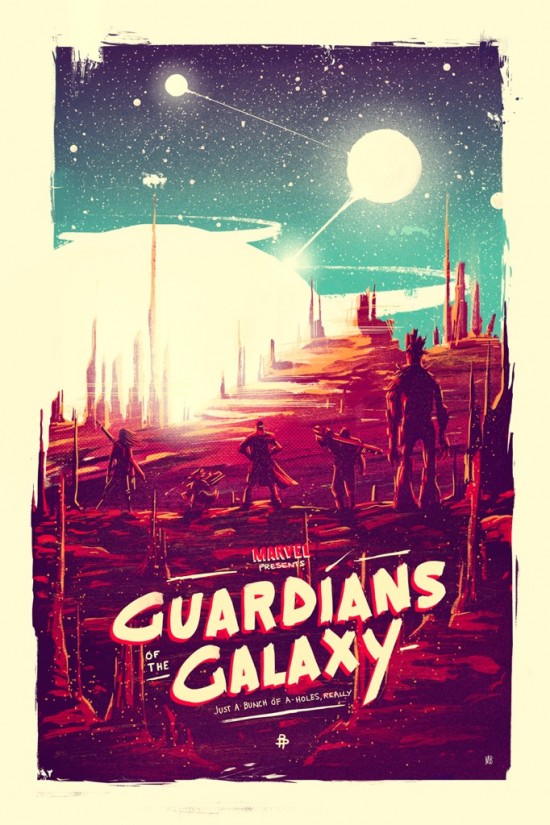 What are the expectations for a film like this? Both the expectations coming on you from the existing fanbase from Marvel, and what kind of expectations did you set for yourself?GUNN: I guess I just don't think of it so much as expectations. I'm definitely trying to make a huge commercial, fun, awesome movie that moves people. I don't know that's an expectation so much as just something I'm trying to achieve. I think in terms of the expectations from the fans listen, one of the great things about Guardians Of The Galaxy is there aren't as many expectations on what to expect when you have The Avengers.
What are the expectations for a film like this? Both the expectations coming on you from the existing fanbase from Marvel, and what kind of expectations did you set for yourself?GUNN: I guess I just don't think of it so much as expectations. I'm definitely trying to make a huge commercial, fun, awesome movie that moves people. I don't know that's an expectation so much as just something I'm trying to achieve. I think in terms of the expectations from the fans listen, one of the great things about Guardians Of The Galaxy is there aren't as many expectations on what to expect when you have The Avengers.
They have 500 plus issues of comics and everybody thinks, "Oh well this is the definitive story, or this is a definitive story, or Hawkeye's personality in issues 59 through 70 is really where he was defined." And the truth is Hawkeye changes throughout all those issues of Avengers. I've read them all, so I know. So, it's like you know, there was a lot of different expectations on what the title should be. With this, there are a lot fewer Guardians of the Galaxy titles to choose from. And there's a lot fewer fans in general of Guardians of the Galaxy. Those types of expectations I think are easier with a movie like this. For me, I'm always hard on myself no matter what, so that's always a thing I have to deal with on a daily basis. And that's whether I'm doing this movie or in a relationship with a girl or whatever. It's like I just beat the shit out of myself constantly. So, same old, same old.
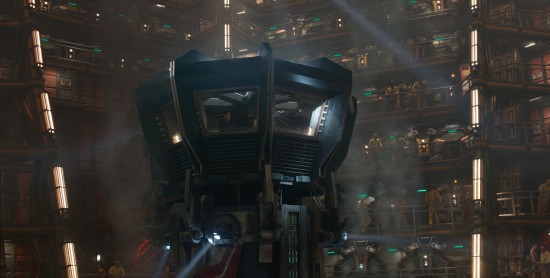 We've been hearing about more than one one-shots, these long takes. Is that something that you built in? How many are there?GUNN: I think that for me, making this movie it's a little bit like a Nirvana song. It's slow and long, and then big and fast, and slow and long, and big and fast. And I really like those—sort of going from really small to really big. So, we have some longer takes in there and then we have a lot of really fast moving scenes with a lot of different shots. And I think both are important and it's a way to make the movie work together as a whole. I think that it's a pretty cinematic film, and for me it's been really exciting. Because every other movie I've been on I've been very, restricted by budget, in terms of the amount of shots I was able to do and the kind of shots I was able to do.
We've been hearing about more than one one-shots, these long takes. Is that something that you built in? How many are there?GUNN: I think that for me, making this movie it's a little bit like a Nirvana song. It's slow and long, and then big and fast, and slow and long, and big and fast. And I really like those—sort of going from really small to really big. So, we have some longer takes in there and then we have a lot of really fast moving scenes with a lot of different shots. And I think both are important and it's a way to make the movie work together as a whole. I think that it's a pretty cinematic film, and for me it's been really exciting. Because every other movie I've been on I've been very, restricted by budget, in terms of the amount of shots I was able to do and the kind of shots I was able to do.
On Slither I think I was able to afford a crane for like 2 days and had to make do. And so on this movie I carry a crane with me every day and I was able to design all the shots exactly the way I want them throughout the whole film. The way I work is, I plan every single thing out ahead of time. In this movie, I found more than any other I'm able to not only make the scenes that I initially saw in my head, but sometimes be plussed quite a bit by a lot of the people around me. Whether it'd be the performers or the designers or whatever, which has been an amazing—that's been like the most amazing experience. I thought was kind of cool in my head and then come on set and start setting it up and see something really beautiful in it. That's really been the coolest thing.
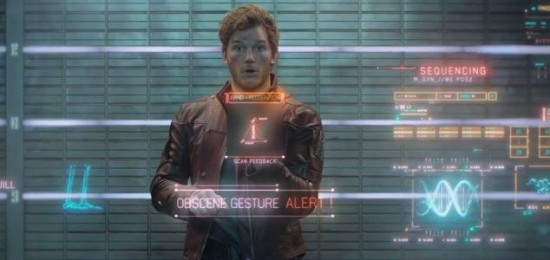 I was hoping you could talk about the tone of the film because it looks really funny but these are also damaged characters. It seems like a dark universe. Where do you strike that balance? And also coming from your R-rated past to PG-13, how has that transfer been?GUNN: Yeah I found that strangely it's — I haven't found any difficulty in myself going from R-rated to PG-13. Occasionally, I get a little too violent but for the most part the person who censored me has been myself. I think that it is a real delicate balance. I think first and foremost, we're making an action adventure film — that's what this is. At its core it's an action adventure film. But there are also a lot of comedic elements and there are a lot of dramatic elements. Which I think people are gonna be surprised to see, frankly, because it really is dramatic. I think that was something that was important to me from the beginning and I think it's something that helps to ground the movie in a way.
I was hoping you could talk about the tone of the film because it looks really funny but these are also damaged characters. It seems like a dark universe. Where do you strike that balance? And also coming from your R-rated past to PG-13, how has that transfer been?GUNN: Yeah I found that strangely it's — I haven't found any difficulty in myself going from R-rated to PG-13. Occasionally, I get a little too violent but for the most part the person who censored me has been myself. I think that it is a real delicate balance. I think first and foremost, we're making an action adventure film — that's what this is. At its core it's an action adventure film. But there are also a lot of comedic elements and there are a lot of dramatic elements. Which I think people are gonna be surprised to see, frankly, because it really is dramatic. I think that was something that was important to me from the beginning and I think it's something that helps to ground the movie in a way.
I think a big part of making this film is, we're making something that's so outlandish and out there with so many crazy situations, and characters and settings, that to sort of keep it anchored in the drama and the reality of these characters' emotional lives is the most important thing in the film. It's been a balance but it feels pretty comfortable. That said, it's still a pretty different movie. And think it's a really different movie for a tent pole, big, huge film to have as much comedy and drama as it has. I think it's very unusual.
I'm curious about the relationship with Marvel. Could you talk about when you met with them, how much were they saying to you, "Hey, this is our idea and what can you do with it?" versus you saying to them, "Hey, this is my idea what do you think?"GUNN: They've been pretty open all long. I have told this story before but when I first went to them, I guess I knew that they were gonna talk to me about Guardians of the Galaxy. When I just heard about it, it didn't really interest me that much.When did you first meet with them?GUNN: I met with them, I think in July of 2011, something like that. I went down there and I had a meeting in Manhattan Beach. I probably just thought I would try to get in and get them to make a Hit Monkey movie again, which I tried to get them to do a few months beforehand. I went down and they're gonna be meeting with me about Guardians of the Galaxy—okay, whatever. And I went and I sat down with Jeremy Latcham and Jonathan Schwartz, and they really pitched me pretty hard on Guardians. I really thought they were meeting with a lot of people and that it wasn't as serious as it was at the time. But they pitched me pretty hard and they showed me the art that had been done for Comic-Con that year, and that really spoke to me. I really liked that artwork that Charlie Wen did.
I kind of thought about it a little bit while I was sitting down with them, then I went home and then I really thought about it. And it just sort of came to me—not the story at all but the visuals of it. I really saw how I visually could see this film and how I could add my own voice to that and really create something different with it that still had some familiarity. So, I went home and I wrote this 15-page document on the visuals of Guardians of the Galaxy and what would it be like, and what would it be like tonally. And what were the basics of what the characters would be like, and I sent it off to those guys and they really liked it.
Then I flew into North Carolina a couple days later. I had drawn up some storyboards and things like that and had a little presentation I did on my iPad, which I have never done, frankly. I have often attributed my success to the fact that I really—I'm trying to say it in the right way—I really don't give a shit. If I get a gig or I don't get a gig, I really have never, ever, ever cared. And this is the first time in my career, I know that I cared, which was terrifying to me because I really did care. I put myself out on the line and went there and did this little dog and pony show. Then I heard a few days later that I'd gotten the gig. But it was like, I knew at the time there there was five of us, I think, that were up at one point and then there was three of us. And then by the time I went to North Carolina there was two of us, and then there was me.
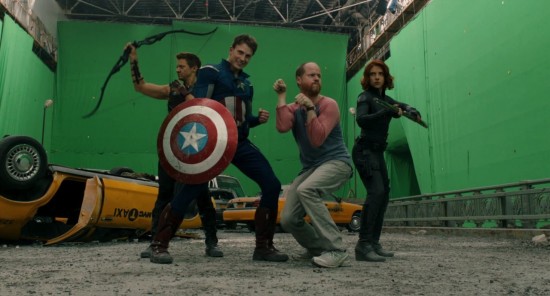 At what point did you call Mr. Whedon and ask, "How was your relationship with Marvel? Is this a good idea?"GUNN: Well, first of all, I'd already talked to Joss a lot about what it was like going through The Avengers—what his experience was like. So, I had already known a lot of that stuff. I don't think I ever really called to talk to Joss—no I did but that's not—that's a lie. I did, I wrote him an e-mail and said, "Hey, I'm trying to get this job. Can you help me?" And he said, "You're fucking late. I already talked to all of those guys all about you. So, yeah I did do that. And I don't do that stuff normally. That's like the most embarrassing thing.I figured it'd be great to have someone who's super honest to at least tell you what it's like.GUNN: Yeah, but I did. After I got the gig, then I called and I talked to him a little bit more about what it was like. But I also knew what Joss's experience was and I knew this from Kevin, was that Joss was the easiest experience Marvel ever had. Because they pretty much agreed and saw things from the same way every step of the way. And they aren't always like that with the directors they work with, and that's been my situation so far as well. I have not had a single—any small disagreement I've ever had with Marvel has been completely for the benefit of the movie. And there's never been like—really, we've seen everything. I mean, I think, again, this is a story I started to tell before. It was after I wrote the first draft of my screenplay, everybody seemed to be very excited. They seemed to really love the screenplay, Louis D'Esposito and Kevin, and everybody was coming to me telling me how great it was.
At what point did you call Mr. Whedon and ask, "How was your relationship with Marvel? Is this a good idea?"GUNN: Well, first of all, I'd already talked to Joss a lot about what it was like going through The Avengers—what his experience was like. So, I had already known a lot of that stuff. I don't think I ever really called to talk to Joss—no I did but that's not—that's a lie. I did, I wrote him an e-mail and said, "Hey, I'm trying to get this job. Can you help me?" And he said, "You're fucking late. I already talked to all of those guys all about you. So, yeah I did do that. And I don't do that stuff normally. That's like the most embarrassing thing.I figured it'd be great to have someone who's super honest to at least tell you what it's like.GUNN: Yeah, but I did. After I got the gig, then I called and I talked to him a little bit more about what it was like. But I also knew what Joss's experience was and I knew this from Kevin, was that Joss was the easiest experience Marvel ever had. Because they pretty much agreed and saw things from the same way every step of the way. And they aren't always like that with the directors they work with, and that's been my situation so far as well. I have not had a single—any small disagreement I've ever had with Marvel has been completely for the benefit of the movie. And there's never been like—really, we've seen everything. I mean, I think, again, this is a story I started to tell before. It was after I wrote the first draft of my screenplay, everybody seemed to be very excited. They seemed to really love the screenplay, Louis D'Esposito and Kevin, and everybody was coming to me telling me how great it was.
Then Kevin came in and—or not—then Joss came in and Joss was happy, but he wasn't as happy as everybody else and I was like, "Whoa, man!" And he's like, "Well, I really loved this and this is great, and the story's been cracked. But you know, I just really want there to be more James Gunn in the script. There's things that are too conventional and I want more James Gunn in it. And I was kinda sitting there and then Kevin and Lou were like, "Yeah, yeah, yeah, yeah." And I was like, "Alright, your funeral." Then I went home and I swear to God, I went home and I wrote a 7-page scene where the guys are in the spaceship arguing about something and it's all dialogue, and we're about to shoot it on Friday. And they were really happy. That was a cool thing and I think it's been a unique situation where Marvel—this group of characters is ready for somebody who sees things in the way I see things. And frankly, I think people are ready to see the movie like that. So it feels good.
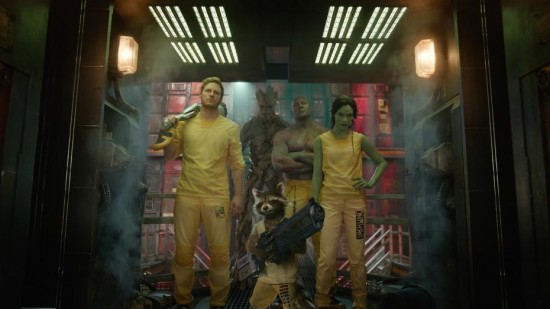 Before The Avengers, all those core characters, and even the villain Loki, all had an origin story beforehand. With this, you're not only building something way out there in the cosmos but you're introducing multiple heroes and villains. How hard it is to balance so many different characters and their introductions, and picking who gets more time?GUNN: Yeah, it seems like it would be harder than it was for me. It wasn't that difficult. I naturally veered towards writing lots of characters in the movies and I think one of the things is I don't have to explain everything. We know exactly where Peter Quill came from in the movie, and we hear about the basic emotional origin of Gamora, Drax and Rocket. But I don't have to explain every little thing. If everything goes as we would hope it would go then we'll have other chances to tell those stories. I think that a lot of times in some of these movies one of the drawbacks can be people try to explain too much and don't explain anything. So, it really is about what are the emotional cores of these characters, how did they become that way, and then what are they fighting against in this movie, from their own characters.Putting aside the expectations of Marvel fans and comic readers, putting this out to the general public, a lot of them don't have any idea who the Guardians of the Galaxy are. What are the major points that you think can draw audiences in to this story?GUNN: I just think it's a fantastic visual world and I think about the movies that I saw when I was a kid that drew me in, in a visual way. And I think today's visuals—the way we speak to kids, teenagers, adults, everybody—is different than that but you're still affecting the same part of the brain. So, how do we get to that same part of the brain that those movies affected me when I was a kid? I think yeah, people don't know the Guardians of the Galaxy, but the truth is, Iron Man was selling 20,000 comic books a month when that movie came out, and that certainly wasn't enough of an audience to make a hit movie.
Before The Avengers, all those core characters, and even the villain Loki, all had an origin story beforehand. With this, you're not only building something way out there in the cosmos but you're introducing multiple heroes and villains. How hard it is to balance so many different characters and their introductions, and picking who gets more time?GUNN: Yeah, it seems like it would be harder than it was for me. It wasn't that difficult. I naturally veered towards writing lots of characters in the movies and I think one of the things is I don't have to explain everything. We know exactly where Peter Quill came from in the movie, and we hear about the basic emotional origin of Gamora, Drax and Rocket. But I don't have to explain every little thing. If everything goes as we would hope it would go then we'll have other chances to tell those stories. I think that a lot of times in some of these movies one of the drawbacks can be people try to explain too much and don't explain anything. So, it really is about what are the emotional cores of these characters, how did they become that way, and then what are they fighting against in this movie, from their own characters.Putting aside the expectations of Marvel fans and comic readers, putting this out to the general public, a lot of them don't have any idea who the Guardians of the Galaxy are. What are the major points that you think can draw audiences in to this story?GUNN: I just think it's a fantastic visual world and I think about the movies that I saw when I was a kid that drew me in, in a visual way. And I think today's visuals—the way we speak to kids, teenagers, adults, everybody—is different than that but you're still affecting the same part of the brain. So, how do we get to that same part of the brain that those movies affected me when I was a kid? I think yeah, people don't know the Guardians of the Galaxy, but the truth is, Iron Man was selling 20,000 comic books a month when that movie came out, and that certainly wasn't enough of an audience to make a hit movie.
I don't know if they're real different. In fact, the Guardians of the Galaxy comic book today is selling five times as much as Iron Man was selling at that time. I don't know how much that part of it really in the end helps you. I always thought the great thing about Marvel was that before Iron Man really, the only comic book super heroes were the really big huge ones that could make money. I think Marvel changed that, in terms of being able to create super heroes that existed in a cinematic world and we saw them in that way.
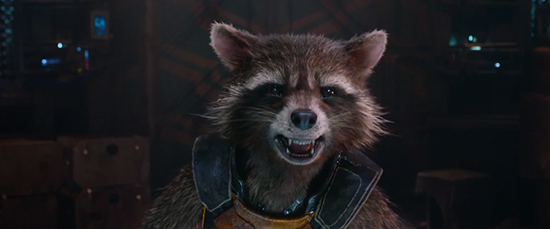 I was hoping you could talk a little bit about casting because the cast of this film is insane. Specifically, I'm curious about what you saw in Bradley Cooper to be the voice of Rocket Raccoon.GUNN: I think that you can find a real through line with the actors who I like and who I've worked with in the past, and who I worked with in this movie. And that is, I really like people who can do both drama and comedy and not some like middle of the road do both drama and comedy. I'm not talking about some guy who does these bland dramedies all the time. I'm talking about people that have done heavy drama and who have done heavy comedy. And if you look back in like Slither, that's what attracted me to Elizabeth Banks, when I first did that.
I was hoping you could talk a little bit about casting because the cast of this film is insane. Specifically, I'm curious about what you saw in Bradley Cooper to be the voice of Rocket Raccoon.GUNN: I think that you can find a real through line with the actors who I like and who I've worked with in the past, and who I worked with in this movie. And that is, I really like people who can do both drama and comedy and not some like middle of the road do both drama and comedy. I'm not talking about some guy who does these bland dramedies all the time. I'm talking about people that have done heavy drama and who have done heavy comedy. And if you look back in like Slither, that's what attracted me to Elizabeth Banks, when I first did that.
They tried to meet with Nathan Fillion, they tried to meet with a lot of different people. I think that you can see that in Bradley Cooper as much as anyone in the world. When we were looking for Rocket, it was hard because Rocket to me is really the heart of the movie. He's this tortured little beast who's completely alone in the world and has been torn apart and put back together and turned into this little thing—yet he's still really funny.
You need somebody who can do both sides of that, and it was really very, very difficult to find. I think Rocket's voice is a little bit like mine in some way. He speaks very quickly, he's got a little city in him and that's something that Bradley Cooper has. To be completely frank, we auditioned a lot of actors for the role and we auditioned a lot of voice actors for the role, and we were completely 100% willing to go with somebody that was a no-name. A no-name's a rude term, but somebody who was not a famous person. The truth is, the voice actors usually seem too cartoony and seemed like somebody out of a Pixar movie. The actors, it was hard to get just the voice right. Bradley is really the guy. He is the guy, he's Rocket. There is a great feeling as I've been making this movie, with myself.
I had a chance to do an a A-list film a couple years ago. I was working on it and after a certain point—and I'm trying to think of how to say this in not an egocentric way, but if it comes out as egocentric, then that's how it comes out. It was like after I was doing it, I'm like, "They just want me to be so vanilla." That at the end of the day, it just seems like any big director could come in and direct this movie and at the end of the day it was gonna end up being the same movie no matter what. I felt useless and it was a lot of money. It was a big thing and I guess it was a good step for my career and maybe it would've helped me be able to go do something I wanted to do more. But it made me sick to my stomach and I really couldn't do it, and I walked because I just—I couldn't do it. And this for me is a dream project because I feel of use every single day.
I don't think, "Maybe somebody else could do a better job, maybe somebody else could do a great job," but nobody is gonna tell the movie in the same way that I'm gonna tell it. There's nobody that would tell the same film that I'm telling right now. And I feel like that's so true about so many of the people we've picked up along the way. I can't tell you about how good Dave Bautista is. There is nobody in the world who could do what he's doing in this movie because Drax has this Shakespearean way in which he speaks and he's this big broad character.
Yet, he's also a very damaged and tender soul and he gets a lot of the funniest lines in the movie. And Dave's able to do all of that and be a gigantic bald dude. It's like, I can't even see how it's possible that we found him and how that happened. He went up against a lot of other actors and when he tested—Academy Award nominated actors and everything—and he got the role because he was the best actor. It's been that way with everybody—with Chris, with Bradley, with Zoe. Karen Gillan is like—
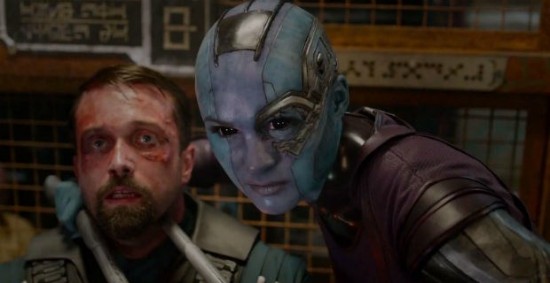 We just saw her costume, that thing looks insane.GUNN: She's awesome looking, right? I know, yeah, yeah. I call her—she's Clint Eastwood on screen, Hello Kitty off. Your little phones can't pick this up but every scene is like, "You know, okay, I'm gonna kill you. Blah, blah, blah, blah, blah." "Cut!" [Imitates giggles]. Every time, it's like I'm constantly laughing.
We just saw her costume, that thing looks insane.GUNN: She's awesome looking, right? I know, yeah, yeah. I call her—she's Clint Eastwood on screen, Hello Kitty off. Your little phones can't pick this up but every scene is like, "You know, okay, I'm gonna kill you. Blah, blah, blah, blah, blah." "Cut!" [Imitates giggles]. Every time, it's like I'm constantly laughing.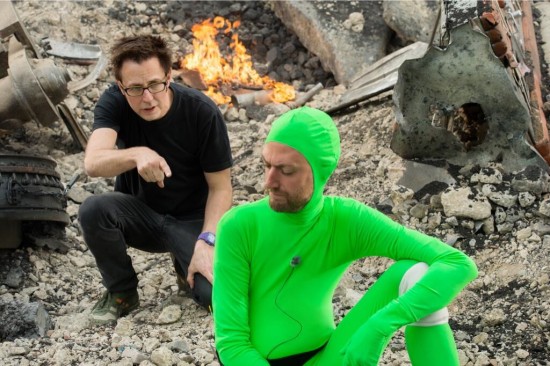 I know your brother is doing stand-in work as Rocket. Are you going to find another role in the film for him?GUNN: Yeah, he's another character. He's sort of Michael Rooker's sidekick in the movie. They're very funny together.
I know your brother is doing stand-in work as Rocket. Are you going to find another role in the film for him?GUNN: Yeah, he's another character. He's sort of Michael Rooker's sidekick in the movie. They're very funny together.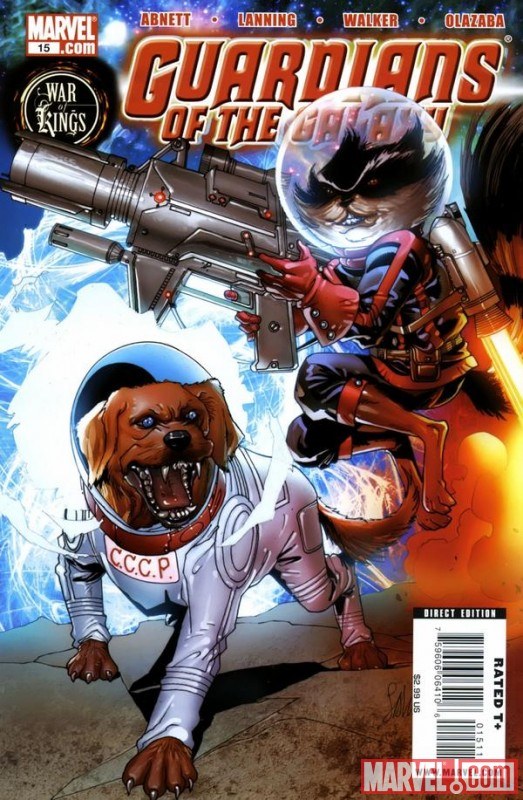 I really want to know about Easter eggs and the fact that you have the Collector in the movie. This can be a film that can possibly set up other things in the Marvel universe. And there could be Cosmo solo films.GUNN: Cosmo. It's hard to get Cosmo to walk around across five steps and lick somebody's face. I don't know if I want to do a Cosmo solo film.I am curious about Easter eggs and how much you were thinking about them.GUNN: Oh, tons.How much are you pitching Marvel, in terms of, "Hey, it'd be cool if we could do this." And how much are you like, "Fuck it. We're putting this in today."GUNN: Well, no. I actually have to clear everything with legal. We put in little things like graffiti on the walls and stuff like that. There's a ton, a ton of characters from the comics in this movie, in little tiny roles. But we have to clear everything with legal because once I use their name then I'm screwed in that scene or whatever. We have just tons of reference to you know Marvel Cosmic throughout the movie. And I'm certain probably the most Marvel comics characters ever in one movie.Really?GUNN: Oh, without a doubt. I would imagine time four, really. If you think about The Avengers, there was a few S.H.I.E.L.D. agents and then all of the Avengers and then be kinda done. With us, we have—almost every little character is named after somebody in the comics. Some of them are far stretches from what they were in the comics. But we try to keep those little things in there for the fans and they can go and they can look them up and see who they are in the Marvel wiki page and stuff like that. But there's a lot of characters.
I really want to know about Easter eggs and the fact that you have the Collector in the movie. This can be a film that can possibly set up other things in the Marvel universe. And there could be Cosmo solo films.GUNN: Cosmo. It's hard to get Cosmo to walk around across five steps and lick somebody's face. I don't know if I want to do a Cosmo solo film.I am curious about Easter eggs and how much you were thinking about them.GUNN: Oh, tons.How much are you pitching Marvel, in terms of, "Hey, it'd be cool if we could do this." And how much are you like, "Fuck it. We're putting this in today."GUNN: Well, no. I actually have to clear everything with legal. We put in little things like graffiti on the walls and stuff like that. There's a ton, a ton of characters from the comics in this movie, in little tiny roles. But we have to clear everything with legal because once I use their name then I'm screwed in that scene or whatever. We have just tons of reference to you know Marvel Cosmic throughout the movie. And I'm certain probably the most Marvel comics characters ever in one movie.Really?GUNN: Oh, without a doubt. I would imagine time four, really. If you think about The Avengers, there was a few S.H.I.E.L.D. agents and then all of the Avengers and then be kinda done. With us, we have—almost every little character is named after somebody in the comics. Some of them are far stretches from what they were in the comics. But we try to keep those little things in there for the fans and they can go and they can look them up and see who they are in the Marvel wiki page and stuff like that. But there's a lot of characters.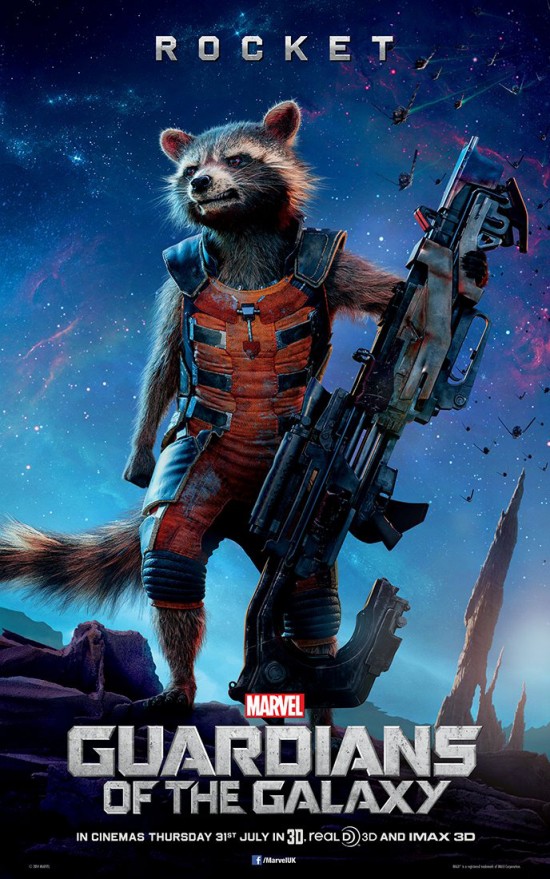 Who's your favorite out of all of them?GUNN: You mean, including Rocket?Yeah.GUNN: Oh, Rocket. Rocket's my favorite. I love Rocket, but there's just great little characters in the movie, and our supporting cast has been awesome.
Who's your favorite out of all of them?GUNN: You mean, including Rocket?Yeah.GUNN: Oh, Rocket. Rocket's my favorite. I love Rocket, but there's just great little characters in the movie, and our supporting cast has been awesome.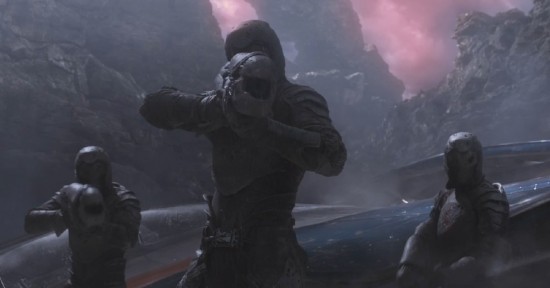 You're also introducing some really important alien races. You're introducing the Kree, which is a big deal for Marvel comics fans.GUNN: Yeah.And then some of the villains here were gonna be Badoon and got changed. Can you talk about introducing the Kree and why the Badoon got changed?GUNN: Well, the Badoon got changed because we don't own Badoon.Oh really?GUNN: Yeah, we don't own it. There's Sakaaran in the movie. I think that's okay to say. There's Sakaaran, I know it's okay to say there's Sakaaran. But yeah, we don't own Badoon, so there's Sakaaran. Fox owns—so they'll probably make them in a great movie.So, we do get to introduce the Kree. Was that anything that was any heavier on you at all?GUNN: I don't feel too heavy about that kind of stuff. And we don't even like—we have plenty of Kree people in the movie. But the only thing we delve into is a little bit with Ronan's back story, which he tells us a little about in one scene. We don't go deeply into, "Hey this is who the Kree are and this is what they do," and all that. They're just a part of the overall galactic landscape.
You're also introducing some really important alien races. You're introducing the Kree, which is a big deal for Marvel comics fans.GUNN: Yeah.And then some of the villains here were gonna be Badoon and got changed. Can you talk about introducing the Kree and why the Badoon got changed?GUNN: Well, the Badoon got changed because we don't own Badoon.Oh really?GUNN: Yeah, we don't own it. There's Sakaaran in the movie. I think that's okay to say. There's Sakaaran, I know it's okay to say there's Sakaaran. But yeah, we don't own Badoon, so there's Sakaaran. Fox owns—so they'll probably make them in a great movie.So, we do get to introduce the Kree. Was that anything that was any heavier on you at all?GUNN: I don't feel too heavy about that kind of stuff. And we don't even like—we have plenty of Kree people in the movie. But the only thing we delve into is a little bit with Ronan's back story, which he tells us a little about in one scene. We don't go deeply into, "Hey this is who the Kree are and this is what they do," and all that. They're just a part of the overall galactic landscape.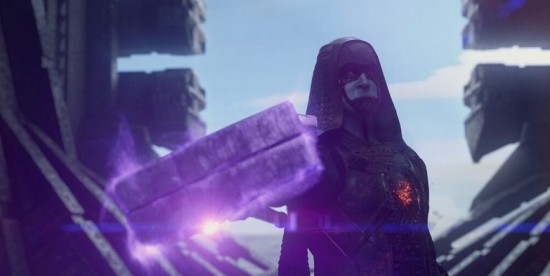 Karen [Gillan] says that Lee [Pace] is pretty scary.GUNN: Well, Karen's pretty scary. But Lee, yeah, Lee's great. Lee's fucking great, he's great.
Karen [Gillan] says that Lee [Pace] is pretty scary.GUNN: Well, Karen's pretty scary. But Lee, yeah, Lee's great. Lee's fucking great, he's great.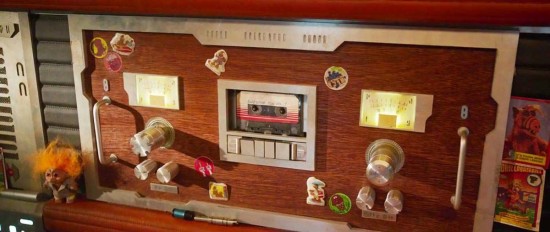 Looking at all the reference pieces you're using, it seems like there's this retro space pop culture theme going on—the Walkman, Drax's space helmet, the music from the sizzle reel. Was that important to you and why?GUNN: Well, yes. I think you're talking about two different things, in terms of how I see it. The first thing is part of the visuals of the movie. When Blade Runner came out and especially, even actually when Alien came out, it kind of changed how all science fiction movies were designed after that. And that was a really great thing. Now we're watching a lot of movies that are xeroxes of xeroxes of xeroxes of xeroxes of Blade Runner. The way that you can be a serious science fiction movie is by being dark and then sometimes kind of Japanese. It's just been too much stuff like that and then there's a certain sort of white look that's like the utopian science fiction, that's a completely different thing. That's gotten equally boring.
Looking at all the reference pieces you're using, it seems like there's this retro space pop culture theme going on—the Walkman, Drax's space helmet, the music from the sizzle reel. Was that important to you and why?GUNN: Well, yes. I think you're talking about two different things, in terms of how I see it. The first thing is part of the visuals of the movie. When Blade Runner came out and especially, even actually when Alien came out, it kind of changed how all science fiction movies were designed after that. And that was a really great thing. Now we're watching a lot of movies that are xeroxes of xeroxes of xeroxes of xeroxes of Blade Runner. The way that you can be a serious science fiction movie is by being dark and then sometimes kind of Japanese. It's just been too much stuff like that and then there's a certain sort of white look that's like the utopian science fiction, that's a completely different thing. That's gotten equally boring.
I really wanted to keep the grittiness of those movies because I like that. I like the—especially in Alien, how these guys were working in outer space and what they're doing in their daily working lives. I like keeping the grittiness of it but I wanted to bring back some of the color of the 1950's and 60's. You know, pulp science fiction movies and inject a little bit more of that pulp feel into things. So, that's where I think that comes from. There's the pulp mixed with the grittiness and that's been throughout the whole movie—the beauty mixed with the ugliness.
One of the big things was the painting Visions Of Light. You know that painting where it's in the nighttime on the ground and day time in the air? That was one of my big guiding forces in the design of the movie, to be able to create these contrasting looks with things. The other stuff is really, it's our tie to this world, and this isn't an outer space film that takes place completely disconnected from this earth or what we've experienced ourselves. It's about a guy who came from here and the only thing he has to attach him to his home is this cassette of music and that's a really important part of the movie. I also think it's something that grounds us a little bit in our own lives, through the use of music in the movie.
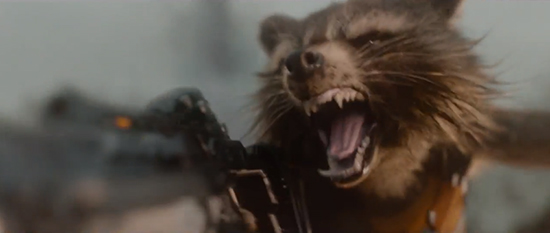 This is your second movie where you have a group of friends have a talking animal with them. Was it weird when you were writing it to think of Rocket as more than just the sidekick? Was it challenging to think of him as an integral part of the group?GUNN: No, not at all. Rocket was the easiest one to write for me. He was just the easiest, I don't know why. I like really tortured anthropomorphic animals. I told you I wanted to write hit monkey. I really saw that as being a part of the movie from the beginning and it flowed pretty naturally. The same thing with Groot, I really love Groot. I probably have so much of a deeper love for those characters than I do the other characters simply because there's more of me in them in some ways, I guess.
This is your second movie where you have a group of friends have a talking animal with them. Was it weird when you were writing it to think of Rocket as more than just the sidekick? Was it challenging to think of him as an integral part of the group?GUNN: No, not at all. Rocket was the easiest one to write for me. He was just the easiest, I don't know why. I like really tortured anthropomorphic animals. I told you I wanted to write hit monkey. I really saw that as being a part of the movie from the beginning and it flowed pretty naturally. The same thing with Groot, I really love Groot. I probably have so much of a deeper love for those characters than I do the other characters simply because there's more of me in them in some ways, I guess.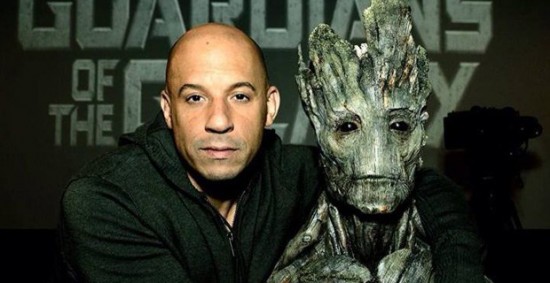 Right now, Vin Diesel is supposedly Groot but there's a lot of conjecture.GUNN: That might happen but it's not done, so maybe.Is it weird for you to have him talking about it, just out there like the way it is?GUNN: Vin's a unique dude. He's his own kind of animal, so I think that's cool. I respect that. He's his own thing.
Right now, Vin Diesel is supposedly Groot but there's a lot of conjecture.GUNN: That might happen but it's not done, so maybe.Is it weird for you to have him talking about it, just out there like the way it is?GUNN: Vin's a unique dude. He's his own kind of animal, so I think that's cool. I respect that. He's his own thing.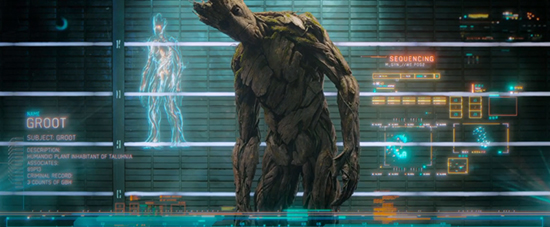 Are we doing to see different version of Groot? Because he's different in the comics, he grows and changes.GUNN: Not exactly but a little, Groot's a little bit different. He's able to grow in this movie. He's able to grow and use his limbs, and grow. He's a pretty threatening, powerful dude and he's also like a puppy. He's more of an animal than Rocket is. But he's very—I don't know.The stuff you took to Comicon this year. It was very early in the process for you and there has to be a little bit of trepidation about taking stuff that's that raw and that new and showing it to that many people. But the response was overwhelming. For you, was that gratifying to hear that the approach had landed the way it did?GUNN: Yeah! You have to ask that question? Yeah, I was stoked! I'll admit, I saw what Disney cut from the footage that we had shot and I felt really good about it. I felt good about that. With 12 days of shooting, I felt really good about that little teaser. I felt like, "God, I think people are gonna like this a lot." You never know for sure but still in my heart, I felt really good about it—just like the same way I feel good about the movie in general. You never know but you have a feeling. You feel good.
Are we doing to see different version of Groot? Because he's different in the comics, he grows and changes.GUNN: Not exactly but a little, Groot's a little bit different. He's able to grow in this movie. He's able to grow and use his limbs, and grow. He's a pretty threatening, powerful dude and he's also like a puppy. He's more of an animal than Rocket is. But he's very—I don't know.The stuff you took to Comicon this year. It was very early in the process for you and there has to be a little bit of trepidation about taking stuff that's that raw and that new and showing it to that many people. But the response was overwhelming. For you, was that gratifying to hear that the approach had landed the way it did?GUNN: Yeah! You have to ask that question? Yeah, I was stoked! I'll admit, I saw what Disney cut from the footage that we had shot and I felt really good about it. I felt good about that. With 12 days of shooting, I felt really good about that little teaser. I felt like, "God, I think people are gonna like this a lot." You never know for sure but still in my heart, I felt really good about it—just like the same way I feel good about the movie in general. You never know but you have a feeling. You feel good.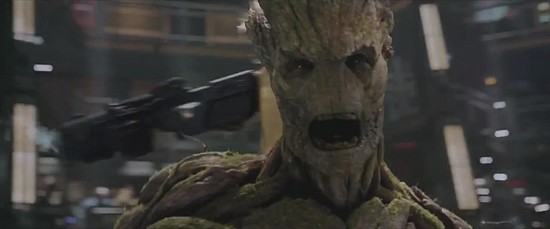 Was the Rocket, Groot stuff from a test? Was that something you had done as proof of concept?GUNN: Part of it was. The shots of Rocket on Groot were from a test but it's a test that's part of the scene in the movie, sort of. It's a little bit different but it's the same basic shots and set up. And then the stuff with him in prison, it was the first step towards those animated—those bits are actually in the movie of them being sent to prison together.
Was the Rocket, Groot stuff from a test? Was that something you had done as proof of concept?GUNN: Part of it was. The shots of Rocket on Groot were from a test but it's a test that's part of the scene in the movie, sort of. It's a little bit different but it's the same basic shots and set up. And then the stuff with him in prison, it was the first step towards those animated—those bits are actually in the movie of them being sent to prison together.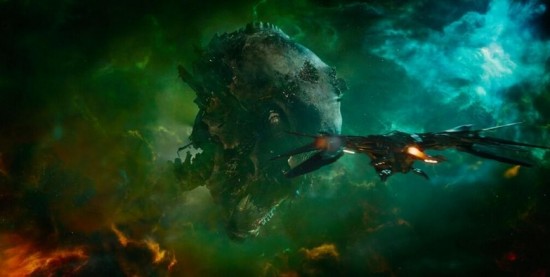 How do you set a movie inside the head of a celestial being? How do you make a commercial, big budget film like that? Is there an amount of handholding you had to do?GUNN: Well, there's only one sequence inside of the celestial head.But the movie is very fantastic and it has a lot of...GUNN: Again, I think it's the same thing that I said earlier. I think it's really being able to have these outlandish situations, this wonderful world around us, but that's not the most important part of the movie. The most important part of the movie is the relationship between the characters and where they're going in terms of their emotional lives and what that is. That's even more funny than being funny. That's more important than the crazy surroundings. It's more important than anything, as long as I can be true to those characters and what their story is—I believe in the story. This is a story about a group of people who are finding out that they're not the pieces of shit that they think they are and it's really that simple. They all think they're pieces of shit at the beginning and throughout the movie they learn that maybe they're a little bit different than who they think they are. I think that's a nice thing to learn and that's really what it's about. As long as I can keep it centered in those emotions and in those relationships, then I think the celestial head becomes a little bit easier to deal with.Awesome.GUNN: I really have to go? I'll take one more, it's good to talk to somebody besides those guys.
How do you set a movie inside the head of a celestial being? How do you make a commercial, big budget film like that? Is there an amount of handholding you had to do?GUNN: Well, there's only one sequence inside of the celestial head.But the movie is very fantastic and it has a lot of...GUNN: Again, I think it's the same thing that I said earlier. I think it's really being able to have these outlandish situations, this wonderful world around us, but that's not the most important part of the movie. The most important part of the movie is the relationship between the characters and where they're going in terms of their emotional lives and what that is. That's even more funny than being funny. That's more important than the crazy surroundings. It's more important than anything, as long as I can be true to those characters and what their story is—I believe in the story. This is a story about a group of people who are finding out that they're not the pieces of shit that they think they are and it's really that simple. They all think they're pieces of shit at the beginning and throughout the movie they learn that maybe they're a little bit different than who they think they are. I think that's a nice thing to learn and that's really what it's about. As long as I can keep it centered in those emotions and in those relationships, then I think the celestial head becomes a little bit easier to deal with.Awesome.GUNN: I really have to go? I'll take one more, it's good to talk to somebody besides those guys.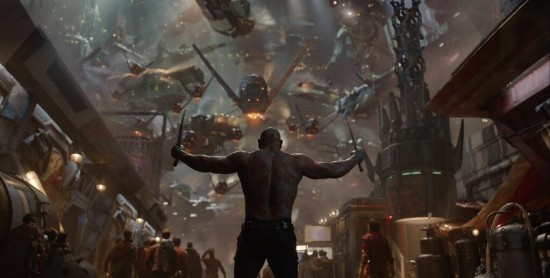 It seems like a lot of the aliens are practical in this movie. Are you doing a lot of practical make-up? But Groot and Rocket Raccoon are obviously CG. How are you going to balance that out? It seems like they're the only CG characters.GUNN: No, there's other CG characters in the movie and that is a balance because I have other characters in the background that I use to balance that out. I have to balance every scene in terms of the CG and practical. But I think it's been something that, if you see my other movies—which are much lower budget movies—it's always been something I've been very into, is the integration of CG and practical effects. And mixing those in a way so that when we try to create something it comes out as something that people don't know exactly how it was made and it looks as real as possible.
It seems like a lot of the aliens are practical in this movie. Are you doing a lot of practical make-up? But Groot and Rocket Raccoon are obviously CG. How are you going to balance that out? It seems like they're the only CG characters.GUNN: No, there's other CG characters in the movie and that is a balance because I have other characters in the background that I use to balance that out. I have to balance every scene in terms of the CG and practical. But I think it's been something that, if you see my other movies—which are much lower budget movies—it's always been something I've been very into, is the integration of CG and practical effects. And mixing those in a way so that when we try to create something it comes out as something that people don't know exactly how it was made and it looks as real as possible.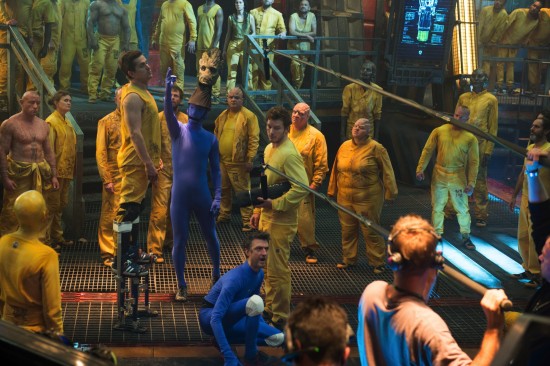 What scene, when you actually shot it and saw it come alive, made you just really geek out?GUNN: Oh, there's certain stuff when they were in the prison. There's a scene where Quill is in the prison asleep and he's on the floor. Have you ever watched Locked Up Abroad? I watched a lot of Locked Up Abroads to base on Locked Up Abroad's. Instead of sleeping in single cells, only the protected inmates are in single cells and he's in this cell with a bunch of—he's asleep with people's feet next to him and on the floor with all these people. There's a scene in there where he's just surrounded by these aliens of different types and having to snuggle up with them.
What scene, when you actually shot it and saw it come alive, made you just really geek out?GUNN: Oh, there's certain stuff when they were in the prison. There's a scene where Quill is in the prison asleep and he's on the floor. Have you ever watched Locked Up Abroad? I watched a lot of Locked Up Abroads to base on Locked Up Abroad's. Instead of sleeping in single cells, only the protected inmates are in single cells and he's in this cell with a bunch of—he's asleep with people's feet next to him and on the floor with all these people. There's a scene in there where he's just surrounded by these aliens of different types and having to snuggle up with them.
I loved that one shot. And there's a scene I shot the other day. My assistant was just crying in the trailer. [To assistant] You were, right? You were crying about 2 hours ago. He was crying, he's like, "Wah." I made fun of him. It's a scene between Drax and Rocket where Drax goes on about his wife and daughter dying and Rocket yells at him. It was a great—it's a really nice scene and it's really beautiful. And Dave Bautista's amazing in it, and yeah.
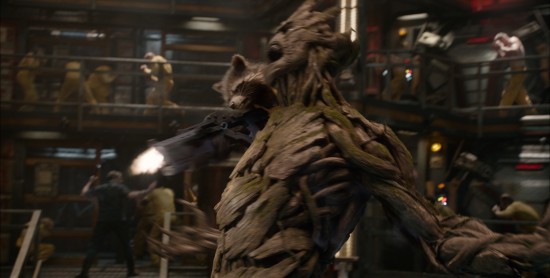 I'm fascinated by the relationship between Groot and Rocket Raccoon because obviously that's a key relationship in the comics.GUNN: Yeah, for sure.I'm curious about bringing that alive and also, do they have a connection before they meet the rest of the group?GUNN: Yeah, they have a background.If you could just talk about that dynamic.GUNN: The dynamic in the movie is similar in some ways to the comic relationship and different in some ways. I think that in the movie, Groot is really the only friend that Rocket has, but Rocket bosses him—he treats him like his slave. He's not always that nice to him but I think that Groot has an innocence that none of the other characters really have. Their relationship is very codependent, I suppose.In terms of dealing with the rest of the group, do they have a tighter bond?GUNN: They're a team, yeah. They come together, they work together at the beginning, when Rocket wants to leave, he wants Groot to go with him. Then Groot sort of brings forth some of his individuality for the first time in the middle of the movie.
I'm fascinated by the relationship between Groot and Rocket Raccoon because obviously that's a key relationship in the comics.GUNN: Yeah, for sure.I'm curious about bringing that alive and also, do they have a connection before they meet the rest of the group?GUNN: Yeah, they have a background.If you could just talk about that dynamic.GUNN: The dynamic in the movie is similar in some ways to the comic relationship and different in some ways. I think that in the movie, Groot is really the only friend that Rocket has, but Rocket bosses him—he treats him like his slave. He's not always that nice to him but I think that Groot has an innocence that none of the other characters really have. Their relationship is very codependent, I suppose.In terms of dealing with the rest of the group, do they have a tighter bond?GUNN: They're a team, yeah. They come together, they work together at the beginning, when Rocket wants to leave, he wants Groot to go with him. Then Groot sort of brings forth some of his individuality for the first time in the middle of the movie.
Were you ever tempted to put your own dog in the Cosmo dog costume?GUNN: No, because Cosmo looks very different than my dog. But my dog is gonna be in another scene. I've also got pictures of him—Your dog is an Instagram star.GUNN: Wait until after this movie comes out because I have him in everything. I've got him in the Dark Aster seat, I've got him in the prison cell, I have him in a space pod, I have him in every single take. I have a picture with him in every single set of the movie. And I've got Djimon Hounsou—I've got Korath hanging out with him. He knows Rooker really well, so he's licking Rooker's face. It's pretty cool.How did you get Disney to okay that scene in the sizzle reel where he basically flicks off the entire audience?GUNN: Well, Disney's been very supportive of me, so this is not a negative thing about Disney. But the deal with Disney and Marvel is that Marvel is creatively in charge of this film. And that was Marvel thing, it wasn't a Disney film but the Disney guys were the guys who put it in there. They were the trailer cutter guys, so they were the ones that put it in. I didn't put it in. I questioned it. I was like,
"I don't know." And that wasn't part of the movie originally. That was something that, Chris did one part of it and he was goofing around. And then I was like, "Okay, now be surprised that you did it." And he's like, "Oh, okay." And it was funny.
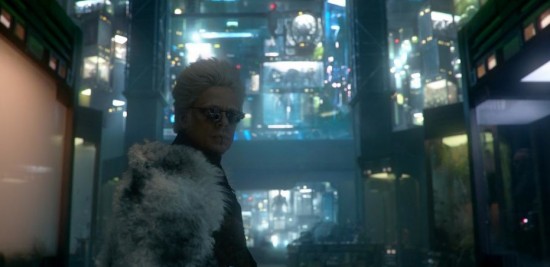 There was a black bar over the middle finger.GUNN: Then one you saw this morning though, didn't have the—No. It was full. Were there certain thing you were able to do in this movie that you've always thought about doing but could never do because of budgetary reasons, script reason, etc.GUNN: All the action, all the shots, man. I love shooting movies. I love the shots. That's the thing that I love doing and I've just never been able to do it. It's like I'm able to breathe for the first time in my life.How does The Collector factor into the main story?GUNN: Well, The Collector's very connected to the overall universe and what's happening in the movie. But within this movie, he's a supporting character. Man, Benicio's the best. He's great. He's really creepy in the movie. He's the most unique character in the film.
There was a black bar over the middle finger.GUNN: Then one you saw this morning though, didn't have the—No. It was full. Were there certain thing you were able to do in this movie that you've always thought about doing but could never do because of budgetary reasons, script reason, etc.GUNN: All the action, all the shots, man. I love shooting movies. I love the shots. That's the thing that I love doing and I've just never been able to do it. It's like I'm able to breathe for the first time in my life.How does The Collector factor into the main story?GUNN: Well, The Collector's very connected to the overall universe and what's happening in the movie. But within this movie, he's a supporting character. Man, Benicio's the best. He's great. He's really creepy in the movie. He's the most unique character in the film.
